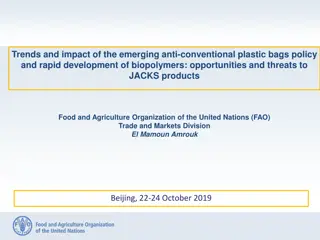
HDPE Bags Manufacturers in Nagpur
Looking for reliable and versatile packaging solutions? HDPE bags are your answer! Crafted from high-density polyethylene, these bags offer exceptional strength, durability, and resistance to punctures and tears. Perfect for various applicationsu201
Download Presentation

Please find below an Image/Link to download the presentation.
The content on the website is provided AS IS for your information and personal use only. It may not be sold, licensed, or shared on other websites without obtaining consent from the author. Download presentation by click this link. If you encounter any issues during the download, it is possible that the publisher has removed the file from their server.
E N D
Presentation Transcript
The Ultimate Guide to HDPE Bags: Features, Benefits, and FAQs High-Density Polyethylene (HDPE) HDPE Bag Manufacturer in Ahmedabad are an essential component in many industries due to their strength, durability, and versatility. Made from HDPE plastic, these bags are used for various applications, including packaging, storage, and transport. In this comprehensive guide, we'll explore the features and benefits of HDPE bags, how they differ from other types of plastic bags, and answer some frequently asked questions about their use. What Are HDPE Bags? HDPE bags are manufactured from high-density polyethylene, a type of plastic known for its strength and durability. This material is created through a polymerization process that involves the high-pressure polymerization of ethylene gas. The result is a tough, resistant plastic that is ideal for various applications. Features of HDPE Bags Durability: HDPE Bags Manufacturers in Ahmedabad are known for their high tensile strength, which means they can handle heavy loads without tearing or breaking. This makes them suitable for packaging a wide range of products, from groceries to industrial materials.
Water Resistance: The material used in HDPE bags is resistant to moisture, which helps in protecting the contents from water damage. This characteristic is particularly beneficial for storing items that need to be kept dry. Chemical Resistance: HDPE bags offer excellent resistance to chemicals and solvents. This feature makes them suitable for handling and packaging chemicals and hazardous materials. Cost-Effectiveness: HDPE bags are relatively inexpensive to produce, which translates into lower costs for consumers and businesses. Their durability also means they offer a good return on investment. Environmental Impact: HDPE is recyclable, which helps reduce the environmental impact of plastic waste. Many HDPE bags are made from recycled materials, contributing to sustainability efforts. Benefits of Using HDPE Bags Strength and Reliability: HDPE Bags Manufacturers in Nagpur are robust and reliable, making them ideal for heavy-duty applications. Their strength reduces the risk of punctures and tears, ensuring that products are well-protected. Versatility: These bags come in various sizes, shapes, and colors, catering to different needs and preferences. They can be used for everything from shopping bags to industrial liners. Ease of Use: HDPE bags are lightweight and easy to handle. They can be conveniently carried, stacked, and stored, making them user-friendly for both businesses and consumers. Customizability: Businesses can customize HDPE bags with printed logos, branding, and other designs. This customization helps enhance brand visibility and creates a professional appearance. Sustainability: By recycling HDPE material and opting for reusable options, businesses and individuals can contribute to environmental sustainability. HDPE bags can be recycled into new products, reducing waste and conserving resources. Applications of HDPE Bags Retail: HDPE bags are commonly used in retail environments as shopping bags. Their strength and ability to handle heavy items make them a popular choice for grocery stores, clothing shops, and more. Industrial: In industrial settings, HDPE bags are used for packaging and transporting bulk materials. They are also used as liners for containers and pallets to protect goods during transit. Agriculture: HDPE bags are used in agriculture for packaging seeds, fertilizers, and other agricultural products. Their resistance to moisture and chemicals makes them suitable for handling these materials. Waste Management: HDPE bags are often used as trash bags due to their durability and ability to contain waste securely. They are also used for recycling purposes, helping to sort and manage recyclable materials.
Conclusion HDPE bags offer a range of benefits, from their durability and strength to their cost-effectiveness and recyclability. Their versatility makes them suitable for a wide range of applications, from retail and industrial use to agriculture and waste management. By understanding the features and benefits of HDPE bags, as well as addressing common questions and concerns, businesses and consumers can make informed decisions about their use and contribute to a more sustainable future. FAQs About HDPE Bags 1. What is the difference between HDPE and LDPE bags? HDPE (High-Density Polyethylene) and LDPE (Low-Density Polyethylene) are both types of polyethylene, but they have different properties. HDPE bags are stronger, more rigid, and more resistant to punctures and tears. They are also more resistant to chemicals and moisture. In contrast, LDPE bags are more flexible, softer, and have a lower density, making them suitable for applications where flexibility is more important than strength. 2. Are HDPE bags environmentally friendly? HDPE bags have environmental benefits due to their recyclability. They can be recycled into new products, reducing waste and conserving resources. However, like all plastic products, they should be used responsibly to minimize environmental impact. Many companies are working to improve the sustainability of HDPE bags by increasing the use of recycled materials and encouraging recycling. 3. Can HDPE bags be reused? Yes, HDPE bags can be reused. Their durability allows them to be used multiple times before they need to be disposed of. Reusing HDPE bags can help reduce waste and extend their life cycle. Many businesses and consumers choose to reuse these bags for various purposes, such as storage or carrying items. 4. How are HDPE bags recycled? HDPE bags are recycled through a process that involves collecting, sorting, and cleaning the bags. They are then melted down and reformed into pellets, which can be used to create new plastic products. Recycling helps reduce the demand for new raw materials and minimizes the environmental impact of plastic waste.
















































